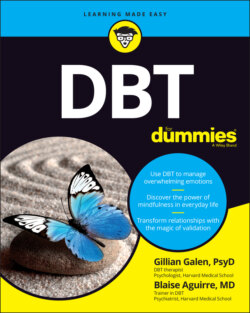Читать книгу DBT For Dummies - Gillian Galen - Страница 89
Realizing that your reaction may be overblown
ОглавлениеIf you’re an emotionally sensitive person, you need to accept, without judgment, that you may often have overblown reactions. Accepting this about some of your reactions will help you recognize when it happens, and that is the first step. In DBT, while we don’t love the term, we talk about two types of emotions, justified and unjustified. This may seem subjective, and in many ways it is. You’ll be the one who determines whether your emotions are justified or unjustified using a few guidelines from DBT. Again, this is not about judging your emotions, but about helping you cope when your emotions are leading to misery and suffering, and to then figure out what skills you can use.
To answer this question, you want to ask yourself three questions:
Does my emotion fit the situation, and does it make sense that this emotion is showing up right now?
Does the intensity to which I am feeling it make sense?
Does the duration that I am feeling it make sense?
Sometimes it’s hard to answer these questions when you’re filled with strong emotions. Here is a helpful trick: We often ask our patients to think about people they know who they feel experience and regulate their emotions well and would provide a reasonable metric for comparison. It could be your group of friends, people you work with, or even other close or extended family members. Try to compare your answers to the preceding three question to theirs. Pick people who you think experience and regulate their emotions in a way that you could use as a model. This is not meant as a comparison that leaves you feeling bad about your emotions, but instead as a means of comparison that will guide your choice of skills. In Chapter 10, we give you some specific emotion regulation skills that you can use once you have identified whether your emotions are justified or unjustified.
